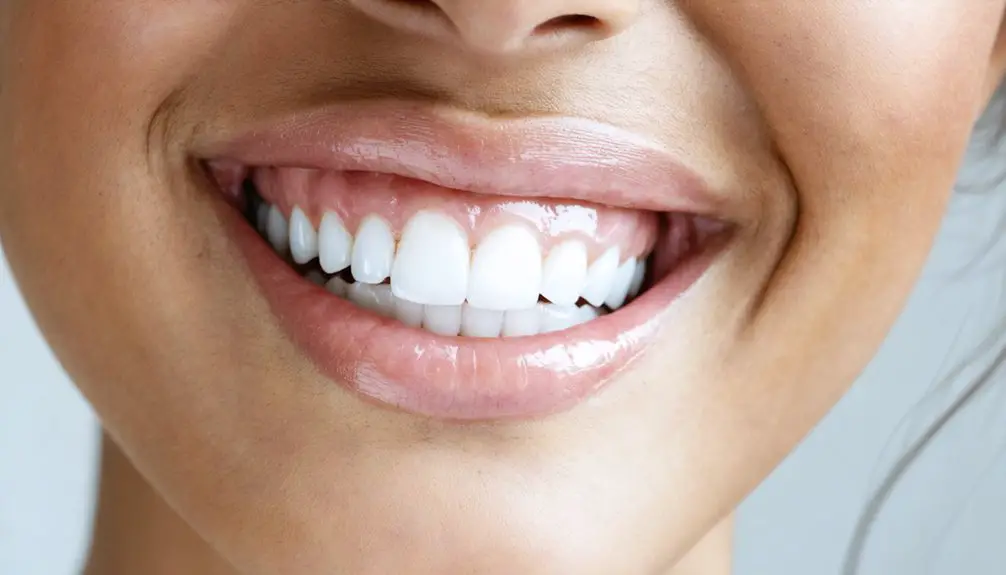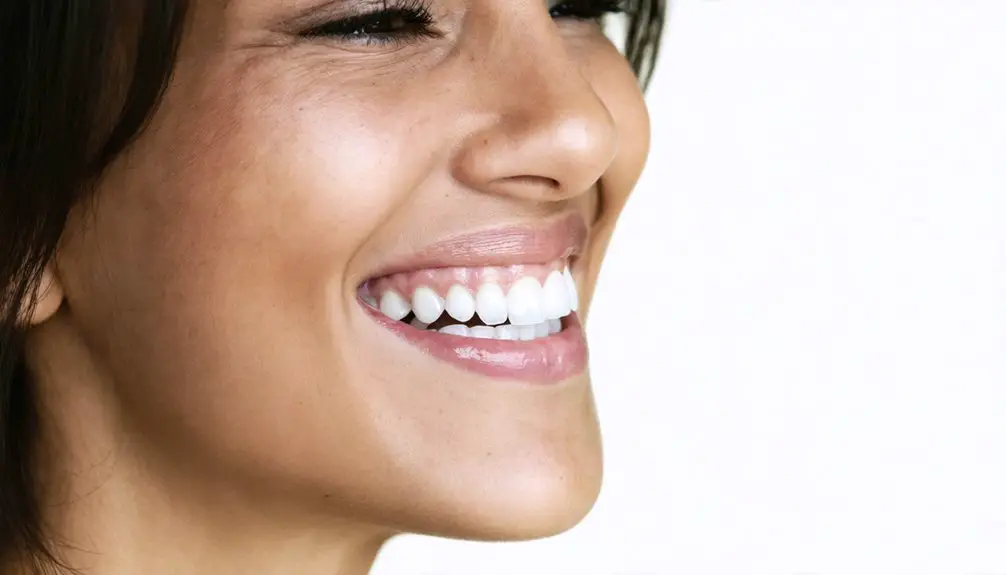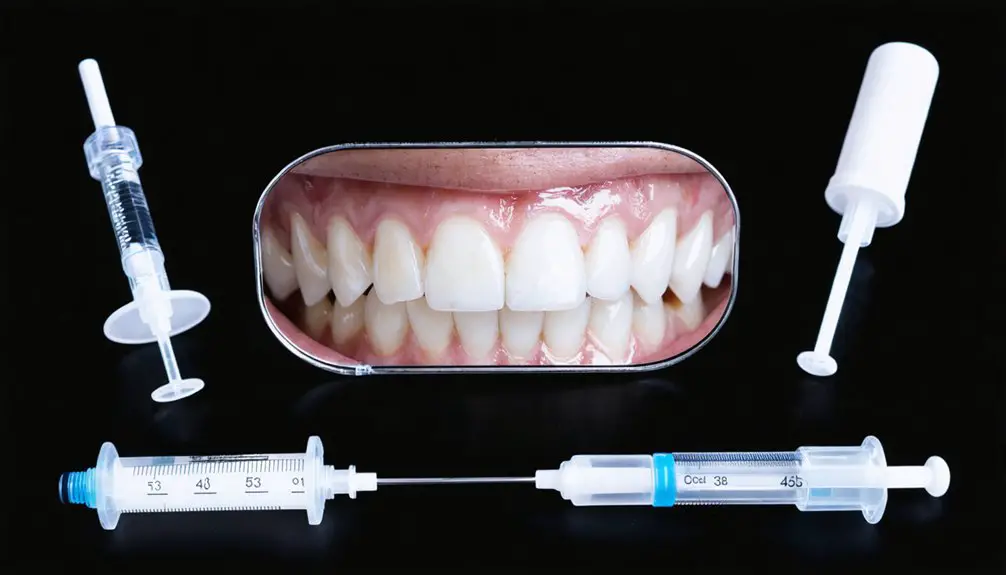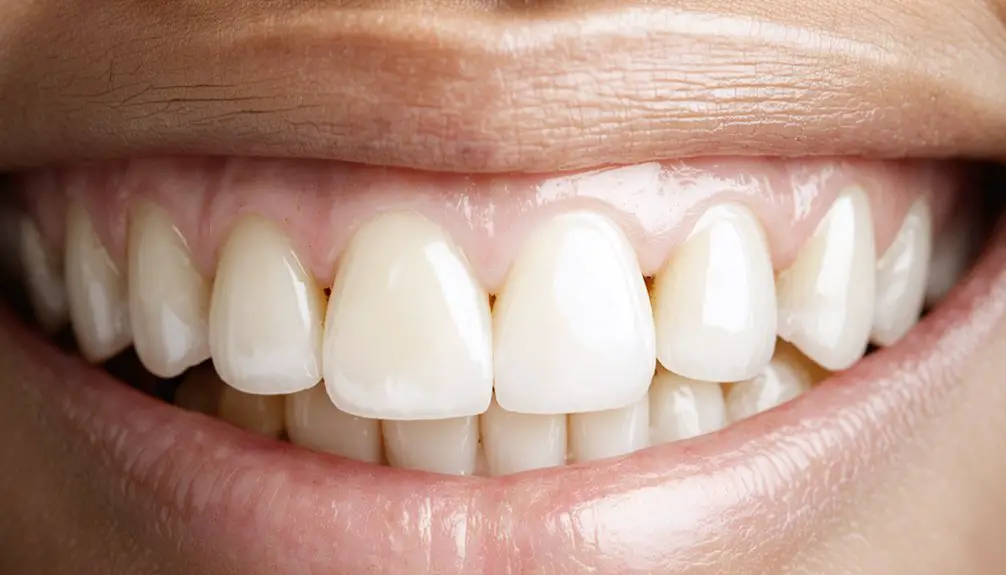You can transform your self-confidence through effective teeth whitening, whether choosing professional treatments or at-home methods. Professional whitening delivers dramatic results in 1-2 hours using powerful peroxide concentrations, while gentler at-home kits offer gradual improvement. Both options boost self-esteem, reduce social anxiety, and enhance your presence in personal and professional settings. Proper maintenance and lifestyle adjustments guarantee your bright smile continues to open doors and create lasting positive impressions.
Key Takeaways
- Professional teeth whitening treatments deliver dramatic results in 1-2 hours using high-concentration peroxide, providing immediate confidence boost.
- Regular at-home whitening maintenance with dentist-recommended products helps sustain bright results and ongoing self-assurance.
- Whiter teeth significantly improve first impressions in professional settings, leading to enhanced career opportunities and social connections.
- Daily oral care routine, including proper brushing and avoiding staining substances, maintains whitening results and confidence levels.
- Teeth whitening directly enhances self-esteem and reduces social anxiety, creating lasting psychological benefits for a year or longer.
Understanding the Psychology Behind Teeth Whitening
While many people focus on the physical aspects of teeth whitening, the psychological impact of this cosmetic procedure runs remarkably deep. When you brighten your smile, you’re not just changing your appearance – you’re transforming how you perceive yourself and how others connect with you.
Clinical research confirms that increased self-esteem directly reduces feelings of self-consciousness in personal interactions.
Recent research in Southampton, PA demonstrated that white, healthy smiles are consistently associated with positive first impressions and perceived success in professional settings.
Studies show that whiter teeth greatly boost self-confidence and diminish social anxiety, helping you break through psychological barriers that may have held you back.
A brighter smile doesn’t just transform your appearance – it empowers you to overcome inner obstacles and shine with newfound confidence.
You’ll notice profound changes in your social interactions as your newfound confidence encourages more frequent smiling and greater engagement with others. This creates a positive feedback loop: your enhanced smile leads to better first impressions, which in turn reinforces your self-assurance.
The psychological benefits extend far beyond aesthetics, influencing your emotional well-being and social relationships in meaningful ways.
The Science of Self-Confidence and Dental Aesthetics
The intricate relationship between dental aesthetics and self-confidence has been extensively documented through scientific research. Studies reveal that when you’re satisfied with your smile’s appearance, you’ll experience heightened self-esteem and reduced social anxiety. This boost in confidence often leads to more engaging social and professional interactions.
Recent findings in Spain demonstrate that young participants show notably low psychosocial impact from dental aesthetics concerns. Your perception of your dental aesthetics plays an essential role in shaping your psychological well-being. Research shows that positive self-assessment of your smile directly correlates with increased self-esteem levels, regardless of clinical measures. Post-treatment data demonstrates that OHIP-14 scores significantly decrease from 30.7 to 18.1, indicating substantial improvements in oral health-related quality of life.
While both men and women are affected, studies indicate that dental appearance particularly influences female self-perception. Through cosmetic improvements like teeth whitening, you’re not just enhancing your smile – you’re investing in your emotional health and overall life satisfaction.
Professional vs. At-Home Whitening Methods
Choosing between professional and at-home teeth whitening methods requires careful consideration of your aesthetic goals, budget, and time constraints.
Professional advantages include powerful whitening agents (25-40% peroxide) that can brighten your smile up to eight shades in just one session, with expert supervision ensuring maximum safety and results. Common side effects like gum irritation and tooth sensitivity are carefully monitored and managed by dental professionals. You’ll see dramatic changes within 1-2 hours, though you’ll need to invest around $300 per treatment.
At-home convenience offers flexibility and affordability, with kits averaging $50. While these contain lower concentrations (3-10% peroxide), you’ll achieve gentler whitening over several weeks. They’re ideal for maintaining results or addressing mild discoloration. Insurance rarely covers cosmetic whitening procedures, making at-home options particularly attractive for budget-conscious consumers.
For best outcomes, consider combining both approaches: start with professional treatment for immediate impact, then use at-home products for maintenance.
Maximizing Your Results: Best Practices and Tips
Successful teeth whitening requires careful preparation and adherence to proven practices before, during, and after treatment. Unlike common whitening myths, results depend heavily on your pre-treatment routine and dietary impacts. Peroxide-based gels have proven highly effective when used correctly in professional settings.
You’ll achieve the best results by avoiding stain-causing foods and maintaining excellent oral hygiene 48 hours before treatment. Modern LED-activated treatments offer customizable intensities to match your sensitivity level while delivering excellent results.
During treatment, use custom-fitted trays for even gel distribution and follow application times precisely. Don’t consume liquids or foods while wearing your whitening trays.
After treatment, protect your investment by avoiding coffee, tea, and red wine for at least 48 hours. You’ll maintain lasting brightness by using whitening toothpaste regularly and scheduling touch-up treatments every 6-12 months.
If you experience sensitivity, consider using lower concentration gels or desensitizing products to promote comfort throughout your whitening journey.
Age-Specific Considerations for Teeth Whitening
While maximizing whitening results requires proper technique, age plays a significant role in determining the most suitable and safe approach to teeth whitening.
For adolescent whitening, you’ll need to wait until permanent teeth have fully erupted, typically around age 14-16, using lower concentrations of whitening agents. The American Dental Association strongly recommends considering patient maturity when making whitening decisions.
Young adult whitening offers more predictable results due to mature enamel, though sensitivity management remains essential. Professional treatments can provide faster results in about 30 minutes under proper supervision.
Young adults typically achieve the best whitening outcomes, as their fully developed tooth enamel responds well to treatment when sensitivity is properly managed.
Middle-aged whitening requires attention to existing restorations and intrinsic stains, while considering potential uneven results.
For older adult whitening, you’ll want to focus on enamel health and address concerns like gum recession before proceeding.
Across all age groups, you’ll need to balance your cosmetic goals with restoration considerations, ensuring proper dental evaluation and customized treatment plans for favorable outcomes.
Cultural Perspectives on Dental Aesthetics
Understanding cultural perspectives on dental aesthetics reveals a fascinating tapestry of beauty standards across the globe.
You’ll find that cultural beliefs greatly shape how different societies view the perfect smile. While Western cultures often prioritize bright, white teeth, Asian communities focus more on alignment and overall dental health.
Regional practices vary dramatically, from Brazil’s emphasis on orthodontic values to traditional remedies in African cultures.
As you explore cosmetic expectations worldwide, you’ll notice how dental tourism has flourished, with patients seeking treatments that align with their aesthetic preferences.
Whether you’re considering teeth whitening or other dental enhancements, it’s crucial to recognize that beauty standards differ across cultures.
Understanding these diverse perspectives can help you make informed decisions about your dental care while respecting various cultural approaches to oral aesthetics.
Mental Health Benefits of a Brighter Smile

When you invest in teeth whitening, you’ll experience a significant boost in self-image that extends beyond just your smile.
Your newfound confidence can help reduce social anxiety, making it easier to engage in professional and personal interactions without feeling self-conscious about your teeth.
The psychological benefits of a brighter smile often manifest in improved self-esteem and reduced social hesitation, allowing you to present yourself more authentically in various social settings.
Improved Self-Image Effects
Confidence radiates from a bright, white smile, profoundly impacting mental well-being and self-perception. When you invest in teeth whitening, you’ll experience significant self image enhancement that extends far beyond aesthetic perception.
You’ll notice reduced feelings of self-consciousness and increased assertiveness in both social and professional situations. Your improved dental appearance will empower you across various life areas, leading to a more positive outlook.
Research shows that addressing dental imperfections through whitening can dramatically decrease psychological distress and negative body image concerns. You’ll feel more relaxed in social settings and find yourself engaging more confidently with others.
The psychological benefits aren’t just temporary – studies confirm these positive effects can last a year or longer after treatment.
Social Anxiety Reduction Benefits
A brighter smile‘s impact on social anxiety extends well beyond mere cosmetic enhancement. When you whiten your teeth, you’ll experience a measurable reduction in social appearance anxiety, helping you feel more at ease in various social settings.
This improvement isn’t just temporary – studies show the positive effects continue even a month after treatment.
You’ll find yourself participating more frequently in social activities as your confidence grows, breaking free from patterns of social avoidance. The boost in self-assurance creates a positive feedback loop: as you smile more often, you’ll naturally create warmer social connections and build deeper trust with others.
Your personality traits, particularly perfectionism levels, can influence how greatly you’ll benefit from these improvements, with highly conscientious individuals often experiencing the most substantial social anxiety reduction.
Long-Term Maintenance Strategies
You’ll need to maintain your newly whitened smile through a consistent daily routine of gentle brushing, flossing, and using alcohol-free mouthwash to prevent new stains from developing.
Schedule professional touch-up treatments every 6-12 months, combining them with at-home maintenance products recommended by your dentist for best results.
Protect your investment by minimizing exposure to staining agents like coffee and wine, using a straw when possible, and staying committed to regular dental check-ups that monitor your whitening progress.
Daily Whitening Care Routine
Maintaining bright, white teeth requires a consistent daily care routine that extends well beyond occasional whitening treatments.
You’ll need to focus on daily brushing with a soft-bristled brush twice daily, using whitening toothpaste to prevent new stains from forming. Don’t forget proper flossing techniques to clean those hard-to-reach spaces where discoloration can develop.
Your lifestyle adjustments play a vital role in stain prevention. You’ll want to limit coffee, tea, and red wine consumption, and when you do indulge, use a straw to minimize contact with your teeth.
Consider switching to an electric toothbrush for enhanced plaque removal and better enamel protection. Remember to rinse your mouth with water after consuming staining beverages, and maintain proper dental hygiene by replacing your toothbrush every three months for ideal oral care results.
Professional Touch-Up Schedule
Every successful teeth whitening journey requires a well-planned professional touch-up schedule to maintain those pearly whites.
Your touch-up frequency typically ranges from six months to a year, though your unique lifestyle and diet choices may necessitate adjustments to this timeline.
If you’re a coffee enthusiast or wine connoisseur, you’ll likely need more frequent touch-ups to combat staining.
Working with your dentist, you can develop personalized treatments that account for your sensitivity levels and desired outcomes.
They’ll help you choose between in-office procedures or take-home options that best fit your schedule and comfort level.
Preventing Future Discoloration
While achieving a bright, white smile is an accomplishment, protecting your investment requires a thorough approach to preventing future discoloration.
By incorporating smart preventive habits and making conscious dietary choices, you’ll maintain those pearly whites for years to come. Your daily routine should focus on protecting your enamel while minimizing exposure to staining agents.
- Brush twice daily with fluoride whitening toothpaste and floss regularly to remove surface stains and prevent plaque buildup.
- Use a straw when drinking coffee, tea, or wine, and rinse your mouth with water immediately after consuming staining foods.
- Support your enamel’s health by incorporating crunchy fruits and vegetables into your diet while limiting acidic foods and beverages.
Addressing Common Concerns and Fears
Because teeth whitening procedures have become increasingly popular, understanding and addressing common concerns is essential for anyone considering treatment.
While teeth sensitivity affects over 50% of patients during whitening, it’s typically mild and resolves within two weeks. You can minimize discomfort by choosing lower peroxide concentrations and following professional guidance.
Regarding enamel safety, proper whitening techniques under dental supervision won’t damage your teeth. However, excessive use of high-concentration products can potentially harm enamel and increase sensitivity.
If you’re concerned about safety, opt for professional treatments rather than unregulated options. Your dentist can recommend appropriate concentrations and treatment durations based on your specific needs, ensuring effective results while protecting your oral health.
Remember that fluoride use during whitening helps prevent enamel erosion and reduces sensitivity risks.
Social Impact of Enhanced Dental Appearance

Your whiter smile can considerably boost your social confidence and enable more comfortable interactions in both personal and professional settings.
When you’re networking or meeting new people, having brighter teeth helps create positive first impressions that can lead to enhanced career opportunities and social connections.
You’ll find that a professionally whitened smile serves as a powerful asset in social situations, as research shows that improved dental aesthetics correlate with better social evaluations and increased perceived attractiveness.
Smiling With Social Confidence
A bright, confident smile can transform how you interact with others and navigate social situations. Through teeth whitening, you’ll experience a remarkable smile transformation that extends far beyond aesthetics – it’s about revealing your social potential and achieving a lasting confidence boost in professional and personal settings.
- You’ll feel more relaxed and less self-conscious when smiling, leading to more authentic connections and improved workplace interactions.
- Your enhanced dental appearance will reduce social anxiety, making you more likely to engage in activities and conversations you previously avoided.
- You’ll discover sustained improvements in your social confidence, with studies showing positive effects lasting up to one year post-treatment.
Networking Through Brighter Teeth
Building on the foundation of social confidence, enhanced dental aesthetics through teeth whitening creates powerful networking advantages in both professional and personal spheres.
You’ll find that whiter teeth can reduce feelings of social anxiety and inferiority, especially when comparing yourself to others in networking environments.
Current teeth whitening trends show that 85% of people experience improved confidence after treatment, translating into greater networking success.
Your enhanced social perception can lead to increased engagement and more meaningful connections. If you’re particularly detail-oriented or perfectionistic, you’re likely to experience even more significant social comfort gains.
Professional interactions become smoother as your improved dental aesthetics boost others’ perception of your competence and trustworthiness.
Remember that maintaining your results is essential for long-term psychological benefits and continued networking success.
First Impressions Matter Most
While first encounters may seem fleeting, the impact of your dental appearance creates lasting social impressions that can greatly influence personal and professional opportunities.
Your smile’s aesthetics play an essential role in how others perceive and interact with you, often determining social advantages in various settings.
- A brighter smile enhances your ability to form meaningful relationships and navigate social situations with increased confidence.
- Your enhanced dental appearance directly impacts job prospects and professional advancement opportunities.
- Whiter teeth reduce psychological barriers in social settings, allowing you to communicate more effectively and authentically.
When you invest in teeth whitening, you’re not just improving aesthetics – you’re opening doors to better social integration and interpersonal connections.
The psychological benefits translate into tangible social advantages that can positively shape your personal and professional journey.
Frequently Asked Questions
Can Certain Medications Affect the Outcome of Teeth Whitening Treatments?
You’d think medications wouldn’t impact your smile, but they’ll greatly affect whitening results through medication interactions and side effects. Many drugs can cause stubborn stains that resist treatment.
How Do Dietary Supplements Impact the Effectiveness of Whitening Procedures?
You’ll enhance whitening results by taking calcium, vitamin D, and antioxidant supplement types before and during treatment. Timing effects matter – consistent supplementation strengthens enamel and supports long-lasting brightness.
Are There Specific Dental Conditions That Could Worsen With Whitening Treatments?
If you have untreated cavities, sensitive teeth, or gum disease, whitening treatments can intensify your discomfort, cause severe gum irritation, and potentially damage your dental health permanently.
What Role Does Genetics Play in Tooth Color and Whitening Success?
Like your grandma’s secret recipe, your genetic factors heavily influence tooth pigmentation, affecting enamel thickness and dentin color, which directly impacts how well your teeth will respond to whitening treatments.
Can Teeth Whitening Affect Existing Dental Work Like Crowns or Veneers?
You’ll find whitening limitations with dental work – whitening agents won’t affect crowns or veneers due to dental material compatibility issues. Your existing restorations will maintain their original color while natural teeth lighten.
References
- https://pmc.ncbi.nlm.nih.gov/articles/PMC12330114/
- https://pmc.ncbi.nlm.nih.gov/articles/PMC6290526/
- https://www.alpinewhite.com/en/article/teeth-whitening-statistics/
- https://www.jaxsmilesdentistry.com/exploring-the-psychological-impact-of-teeth-whitening/
- https://www.loudfamilydentistry.com/blog/cosmetic-dental-treatments-related-statistics-on-confidence-and-quality-of-life-improvements
- https://www.southamptonad.com/the-impact-of-teeth-whitening-on-smile-perception-and-confidence-a-case-study-in-southampton-pa
- https://montgomeryparkdentalcare.com/dentist/brighten-your-smile-boost-your-confidence-the-psychological-power-of-teeth-whitening/
- https://www.gilbertdentalcenter.com/the-psychology-of-a-white-smile-the-impact-of-teeth-whitening-on-confidence/
- https://drritapeck.com/psychological-benefits-of-teeth-whitening/
- https://www.alabamafamilydental.com/12-psychological-effects-of-teeth-whitening/



